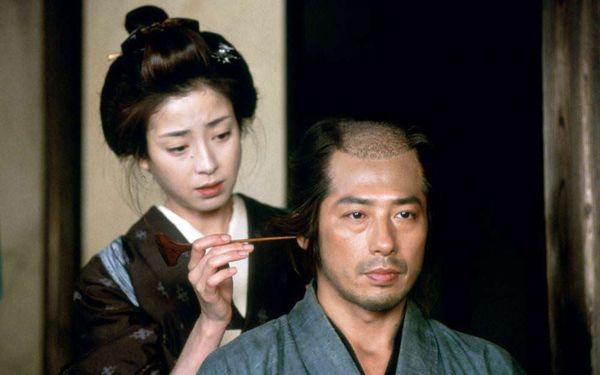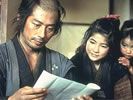Eye For Film >> Movies >> The Twilight Samurai (2002) Film Review

Confucius would probably have said something along the lines of "Being a samurai is hard, my son, but not half so hard as being a single dad." Then again, maybe not.
Unlikely though it may seem, this is the backstory to an engaging and enjoyable epic. Samurais have always made good celluloid, but it is the Japanese skill at focusing on individuals against the sweep of history that has ensured the success of films such as Seven Samurai and Rashomon.

In Yoji Yamada's Oscar-nominated film, it is the human struggle which matters more than the movement of kingdoms.
Seibei Iguchi (Hiroyuki Sanada) may be a retained samurai but he's way down the pecking order when it comes to perks. He's only at the 50-koku level, which is not good when your wife has just died and you have two young daughters and a senile mum to support. Ditching his social life in favour of his family, he rushes home each evening to be with them and to craft insect cages to make ends meet. His fellow clansmen try to persuade him to join them for a swift saki or two but he always declines, earning him the nickname of The Twilight Samurai. Many think that he should remarry but with his needy family and personal hygiene problems brought on by lack of time in the evenings he isn't much of a catch.
He finds happiness in his poverty, however, until a chance conversation with an old friend results in the rekindling of a relationship with childhood friend Tomoe (Rie Miyazawa), who has recently been divorced by the will of the clan elder after her drunken husband viciously beat her. On walking her home, he finds himself forced to defend her honour, an action which inadvertently leads to a much more serious confrontation.
Although the subjects of divorce, female emancipation and single parenthood may seem comparatively modern themes, they nestle into the 19th century setting perfectly. This is an age-old tale of star-crossed love, which has no trouble surviving the years. Sanada hits all the right notes, as Seibei, a man torn between loyalty to his retainers and love of his family, and Miyazawa is convincing as a grown woman who has never really stopped being a tomboy.
There is violence - the gritty, bloody kind, not the balletic jumping off walls variety - but it is kept firmly in its place and never allowed to take over. In fact, Twilight Samurai unashamedly romanticises its characters and period, but does so charmingly. You sense the landscape is too tidy, considering there are dead peasants floating down the river on a daily basis, and you wonder just how well a divorcee would be treated, even if she had suffered abuse.
The film is from the Merchant Ivory school of history, where things are clean and neat and true love, if not all-conquering, at least gets a look in. It may not be the height of realism, but can certainly cut it with the best.
Reviewed on: 12 Mar 2005

















